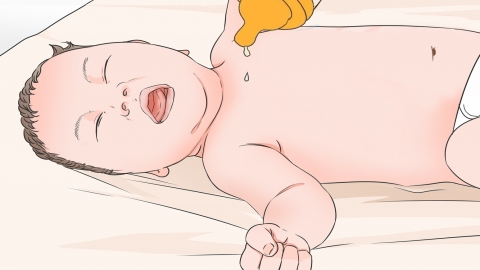Why Do Newborn Babies Cry Throughout the First Day After Birth?
Generally, the main causes for a newborn's persistent crying on the first day after birth include hunger, urination, defecation, neonatal omphalitis (navel infection), neonatal hypoglycemia, and neonatal colic. If the baby's crying persists or is accompanied by abnormal symptoms, it is recommended to seek medical evaluation promptly. Detailed explanations are as follows:
1. Hunger
Newborns have small stomach capacities, and breast milk or formula milk is digested quickly, making them prone to hunger. When hungry, babies express their needs through crying. Feeding should be provided promptly. For breastfeeding, mothers can nurse on demand, allowing the baby to suckle frequently. For formula-fed babies, follow the doctor's recommendations regarding feeding volume and intervals to ensure adequate intake.
2. Urination and Defecation
Newborns have delicate skin, and wet or soiled diapers can cause discomfort due to skin irritation. Parents should check the baby's diaper regularly and promptly replace it with a clean, soft one after urination or defecation. Handle the baby gently during diaper changes to avoid skin abrasions.

3. Neonatal Omphalitis
If the umbilical cord stump is improperly cared for after birth, it may become infected with bacteria, leading to neonatal omphalitis. Inflammation may cause localized pain and discomfort, resulting in crying. Follow medical staff's instructions strictly for umbilical cord care. Clean the umbilical cord stump daily with iodophor disinfectant and keep the area dry. If redness, swelling, or discharge occurs, topical medications such as mupirocin ointment, erythromycin ointment, or fusidic acid cream may be applied under a doctor's guidance to prevent worsening infection.
4. Neonatal Hypoglycemia
Newborns' blood sugar levels can fluctuate easily after birth. Insufficient feeding or abnormal metabolism may lead to neonatal hypoglycemia, which can cause symptoms such as lethargy or persistent crying. Monitor the baby's blood sugar closely and provide timely supplementation with breast milk or formula if feeding is inadequate.
5. Neonatal Colic
Since the gastrointestinal system of newborns has not fully developed, irregular intestinal motility may lead to intestinal spasms and neonatal colic. The pain may cause intense crying. You may hold the baby upright and gently pat the back to help release gas, or gently massage the baby's abdomen in a clockwise direction to relieve intestinal spasms.
In daily life, provide a quiet and comfortable environment for the baby, avoiding strong light and noise. Handle the baby gently to provide a sense of security. Closely monitor the baby's mental status, feeding, and elimination patterns, and seek medical attention promptly if abnormalities occur. Complete all recommended neonatal examinations as advised by the doctor to ensure the baby's health.








